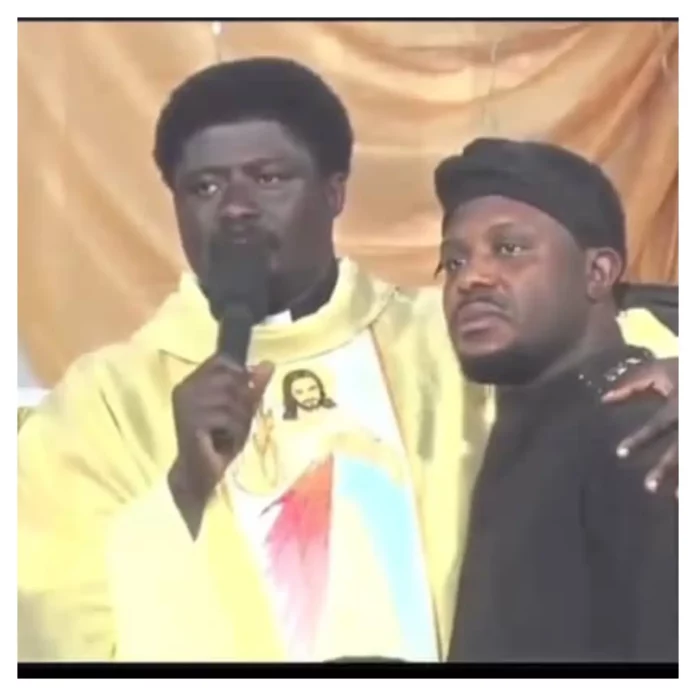A harrowing tale of kidnap, intervention, and determination unfolded recently in Anambra, where the Spiritual Director of Holy Ghost Adoration Ministry, Rev. Fr. Emmanuel Obimma, known as Ebube Muonso, took matters into his own hands to rescue a young priest, Rev. Fr. Nonso, after a week-long ordeal in the hands of kidnappers.
Fr. Nonso, an abroad-returned priest, had barely returned to his home state for the Christmas holiday on December 17, 2024, when he was seized by kidnappers. Held captive deep in the forests of Anambra for nearly a week, his fate appeared uncertain as the state’s security apparatus struggled to take any significant action.
Speaking to his congregation on the successful rescue, Rev. Fr. Obimma, a highly respected Catholic figure in the region, expressed his deep frustration at the state’s inability to ensure the safety of its citizens despite security votes allocated to the government.
“For a week, Father Nonso was in the hands of the kidnappers,” Fr. Obimma recounted. “And yet, the state was unable to do anything. It reached a point where I had to personally intervene. We have a state with a governor who receives a security vote, but it is now individuals who have to fund their own security.”
Fr. Nonso’s abduction had seemed like another statistic in the increasingly rampant cases of kidnapping in Anambra State, where organized criminal syndicates have become notorious for snatching individuals, from priests to businessmen, for ransom. However, what followed would reveal the depth of the breakdown in state security systems.
Fr. Obimma made clear his disbelief at the government’s indifference to the crisis, noting that despite the availability of tracking technology, no concrete steps were taken to pursue the kidnappers. “The kidnappers kept Fr. Nonso’s phone line open for the entire duration, knowing well that they could be traced through it. But no one moved,” he continued, visibly upset.
As the days dragged on with no progress from the police or other authorities, Fr. Obimma sought alternative measures. Calling in favors from outside the state, he managed to locate Fr. Nonso’s position using a tracker. With this crucial information in hand, he immediately relayed it to local security forces, only to be met with hesitation. According to Obimma, when he reached out to the security officers, they claimed they could not act because they lacked logistics for the operation.
The situation quickly turned dire as time ran out for the victims. Refusing to wait for a government response any longer, Fr. Obimma mobilized a group of loyalists to carry out a rescue mission, personally taking charge of the operation.
“I told the Chief Security Officer at Adoration to assemble a team. I called for those with cutlasses and those with guns to join the mission. I would lead it myself,” Fr. Obimma revealed. “It was only when the police saw I was serious that they decided to intervene, but even then, they asked for a financial contribution to help fund the mission.”
In a further revelation that highlighted the limitations of Anambra’s law enforcement resources, Fr. Obimma disclosed that he was forced to send N1 million to aid the police with logistics.
This astonishing act of initiative — taken in a state where many residents feel abandoned by the authorities — seemed to break the proverbial silence. According to Fr. Obimma, this intervention led to the eventual release of Fr. Nonso, along with a businessman who had been kidnapped on the same day by the same gang, though at a different location.
This event calls attention to the severe security lapses in Anambra State, and Fr. Obimma did not hold back in his criticism of the local government’s inability to effectively address the kidnapping epidemic that has plagued the region.
“Imagine we have a state where the governor is allocated security votes, but the common citizen is left to fend for themselves,” Fr. Obimma remarked. “It took me using my resources, reaching out to another state, and coordinating a rescue myself, just to ensure my brother priest’s safety. The government did nothing.”
He further slammed the apparent disregard for available technologies such as the tracking systems used during the operation. According to Fr. Obimma, during the tenure of former Governor Willie Obiano, trackers had been purchased to assist in the fight against crimes such as kidnapping, yet they had either gone unused or failed to assist security personnel when they were most needed.
Fr. Obimma’s impassioned speech underscored the deep disconnect between the governing authorities and the daily struggles of the people in Anambra. His candid remarks painted a picture of a state struggling with governance, with the security of its citizens lying more in the hands of individuals than the government.
“It is heartbreaking,” Fr. Obimma expressed. “The kidnappers were confident in their actions, knowing that Anambra’s security was compromised, and they could operate with impunity.”
As Fr. Nonso returned to the safety of his family and community, there were signs of relief, but many — like Fr. Obimma — are not optimistic about the state’s future security posture. He emphasized that what happened to the abducted priest was not an isolated incident, but symptomatic of a larger, ongoing problem.
Without any visible signs of lasting change, Fr. Obimma had little choice but to continue relying on unconventional methods to ensure the safety of those he loves and serves. His leadership in this particular crisis was one of determination in the face of staggering adversity, a rarity in the current security climate of Anambra State.
In the weeks that followed, calls for increased governmental accountability and intervention have only grown louder, as citizens and church leaders alike demand urgent reforms to protect lives and reduce the frequent kidnappings in the region.

